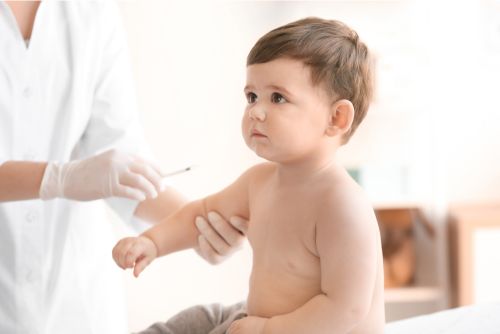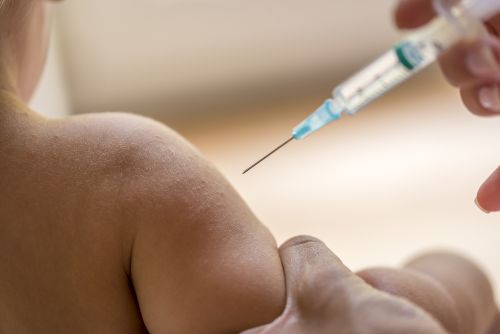

BCG is a vaccine given to protect children from severe forms of tuberculosis. In India, where tuberculosis is common, BCG is a vital vaccine that can shield your baby from the condition.
To Visit: Best Pediatrician in Mumbai
Initially, the location at which the BCG vaccine is given likens to a mosquito bite. It then goes on to become a small red swelling or occasionally, a pus-filled pustule, until it eventually ruptures and heals into a scar. The healing process is not painful and does not cause any discomfort to your baby. That said, it is important to avoid applying anything to the scab or scar as this may delay healing and affect immunity.
The BCG vaccine is the only type of vaccination administered intradermally (between the layers of the skin), so healing may take over 3 to 4 months.
The hepatitis B vaccine serves as a shield against hepatitis B, a virus that attacks the liver and spreads through blood contact, sexual contact and contaminated needles.
The first dose of this vaccine is given soon after birth. On Cloudnine, our gold-standard hepatitis B vaccines are designed to be mercury-free, meaning that they are perfectly safe and suitable for your baby.

The DTwP and DTaP injections can prevent pertussis (whooping cough), a severe lasting cough that causes difficulty breathing and sometimes even death.
Many parents consider the DTaP vaccine a painless alternative to the DTwP. Although this is not actually true, the DTaP does present fewer side effects than the DTwP, by virtue of its purified pertussis component. This component does not contain all the elements of the pertussis bacteria; only those that are critical to immunity.
The DTP and DTaP injections work as safeguards against diphtheria and tetanus. Diphtheria is a painful infection that blocks the throat. It is capable of causing heart and nerve damage and even death. Tetanus is a condition just as lethal. Usually triggered by cuts or gashes in the skin, it can lead to deadly muscle spasms.
The Sabin oral and injectable polio vaccines can prevent poliomyelitis, a debilitating disease that can paralyse parts of the body, including the throat.
We are routinely asked whether the Sabin oral and injectable polio vaccines overlap with the government’s Pulse Polio Initiative (PPI). PPI is totally different from our recommended routine polio vaccinations. As an official polio-free country, PPI provides outreach whenever there is a polio threat. In such cases, the government extends ‘booster’ immunity protection to all children below 5, even those with previous polio immunisations.
Yes, the current recommendation is to give your baby both polio drops and polio injections for superior protection.
The HIB vaccine can protect against Haemophilus influenza types B-triggered conditions like meningitis and other childhood infections. It is a mandatory vaccination as per the Government of India.
The MMR vaccine offers a secure wall against measles, mumps and rubella. Measles and rubella are highly contagious viral diseases characterised by uniquely red rashes. Mumps meanwhile, is a viral illness that causes the swelling of glands, testicles and other important organs. Without adequate protection or treatment, measles, mumps and rubella can permanently damage the ears, lungs and brain. The MMR vaccine is an imperative inoculation that must be on your vaccination roster.
Chickenpox causes serious skin, eye and lung infections, and occasionally brain infections that result in intellectual disability. It can be prevented with the chickenpox vaccine. The vaccine is typically administered in two doses: the first, at the one-year mark, just as maternally transferred antibodies have started to disappear from the baby’s body, and the second, at around 5 years of age. The comprehensive vaccination programme ensures lifelong protection.
Influenza causes fever, headache, sore throat, cough and aches. It can be life-threatening for some people. The flu vaccine prevents the onset of influenza.
.jpeg)
The flu vaccine needs to be administered annually for renewed protection, as per the WHO antigen recommendation. This vaccine is highly advisable for young babies and people older than 65 years of age.
Hepatitis A can cause jaundice and serious liver diseases. For some children (and older adults), the condition can be fatal. The hepatitis A vaccine can prevent this deadly disease.
The hepatitis A vaccine is administered in two doses. It is important to note that the second dose of the vaccine should be given after 6 months of the first dose, but before 18 months (preferably around 12 months after birth), to ensure lifelong protection.
Typhoid is a serious disease that causes significant morbidity and mortality in India. The typhoid vaccine can secure your child against typhoid for a period of three years, after which a booster shot is required for renewed protection.
Pneumococcal infections are a serious threat to children under the age of 5 and adults over the age of 50. This class of infections can give rise to pneumonia, meningitis and a host of other serious infections in children, capable of crippling or even killing them. The pneumococcal conjugate vaccine provides protection against pneumococcal infections.
There are two categories of the vaccine currently available globally; your paediatrician can advise you on that best suited for your baby.
Rotavirus is unrestricted to a particular stratum of society. It is equally prevalent everywhere, and is thus known as the ‘democratic virus’. The virus causes vomiting and diarrhoea, and in serious cases, dehydration-induced death. The rotavirus vaccine serves as a barrier against rotavirus. The immunisation programme for rotavirus is usually composed of three separate doses.
Infections are triggered by germs that invade the body through openings such as cuts or gashes, or simply through inhalation or ingestion. Unabated, germs can give rise to fatal infections like meningitis, septicaemia and pneumonia.
A disease qualifies as contagious when it is capable of spreading from a person who is a carrier to another person through physical contact like kissing or touching, or via airborne transfer like coughing or sneezing. Carriers may or may not exhibit symptoms themselves, but can infect others in close proximity.
Your child has a resilient inbuilt immune system that produces antibodies on the entry of germs into the body. Antibodies fulfil two roles in the immunity mechanism. First, they tackle unwanted germs that have entered the system, and second they form an invisible shield as a safeguard against future infections. However, your child’s body may take time to release antibodies on sensing a threat of new germs, leaving a window for infections to take root. At the same time, your child’s body will learn to recognise old germs, releasing pre-existing antibodies to destroy them before they have a chance to strike again. This process is known as natural immunity.
Unfortunately, natural immunity is built organically through cycles of sickness and recovery. That means that your child must be subjected to diseases and illnesses for them never to return. Without vaccinations, your child’s immune system may be too weak to handle severe conditions, which could ultimately prove fatal.
A vaccine mimics the invasion of germs, prompting your child’s body into battle mode. In turn, the body releases antibodies in the same way it would if it were fighting an illness. This process ensures that the antibodies produced remain in your child’s system long after the administration of the vaccination, warding off any threat of the actual disease.

Vaccines typically take a few weeks to take effect, leaving your child unprotected in the interim window. Also, a large majority of vaccines are given in stages, building secure layers of immunity over a long-term period. By failing to follow through with the prescribed number of vaccination doses for a particular disease, your child may still be at risk of contracting the condition.
Some vaccines are given in stages, especially those in a child’s early years. Incremental doses augment the body’s antibody production and response mechanism, ensuring enhanced long-term protection.
Infants are at maximum risk of contracting diseases, owing to their underdeveloped immune systems. Thus, it becomes imperative to envelop them in protection as early as possible. For instance, babies 6 months or less are most susceptible to complications arising from pertussis. About 60% require hospitalisation and about 90% of all pertussis cases fall in this age bracket.
It is natural to worry that an intensive vaccination schedule may put extra pressure on your child’s immune system. Rest assured that your child’s immune system is strong enough to withstand the prescribed vaccinations in close succession. In fact, there is evidence to suggest that the spacing of vaccines has little effect on safety or effectiveness. The measles, mumps & rubella (MMR) vaccine is a good example of how a single preventive vaccination, administered in two doses, can shield your child against three independent conditions which would otherwise require two injections each. Combination vaccines like the MMR are convenient and comprehensive and allow for fewer total injections. By completing your child’s vaccination roster early, you can gift them lifelong protection against fatal diseases and illnesses.
No. Most vaccines are age-agnostic and if your child misses one dose in a vaccination roster, there is no need to start all over again. The importance of administering vaccines early is rooted in providing your child with potent protection at an early age.
Vaccines build a wall of protection against certain diseases. Without this wall, your child could be at risk of contracting any of these diseases, in infancy or adulthood. With no assurance of their severity, these diseases could manifest in their mildest form or could warrant hospitalisation. In some cases, they could even lead to death.
Without vaccinations, there is always a risk of exposure to fatal diseases. Diphtheria, measles and mumps, for instance, can do more damage in adults than children. Mumps can cause an inflammation of the testicles if contracted during adolescence. Likewise, pregnant women exposed to rubella are likely to have a baby with congenital defects.
Vaccines are remarkable safeguards, but they are not always foolproof. Childhood vaccinations protect up to 99% of recipients, with the exception being some children who fail to respond. On Cloudnine, we are working towards creating an immunity ecosystem that covers all children. A child who has not responded to immunisation can still be protected by being encircled in an environment where others are immunised. Your child could be free of risk from immunised children, but not from children who have not been immunised, and are carriers of serious conditions.
Vaccines are composed of two chief elements: the core vaccine itself, and preservatives or stabilisers. The core ingredient of a vaccine is made of the same germs responsible for infections; however, in their vaccine form, these germs are either destroyed or diminished, making them completely safe for use on your baby. Vaccines are underpinned by preservatives or stabilisers that minimise the risk of contamination, ensure an even composition and boost the body’s ability to accept external chemicals. You can rest assured that the additive component of vaccinations are minimal and within globally recommended thresholds.
We are certain that there is no link between vaccines and conditions like autism, diabetes, multiple sclerosis, allergies, asthma and attention deficit disorder. However, many conditions begin manifesting at around the same age that immunisations are administered, and there has historically been a misperception that vaccines play a role in triggering certain diseases. Autism, for instance, begins exhibiting telltale signs at the same age that the MMR vaccine is administered. Despite the ostensible association, studies have shown that vaccines and childhood conditions are mutually exclusive.
There are very few scenarios under which you should consider delaying immunisation. A high temperature is one, where you should wait until your child has recovered before proceeding with vaccinations. However, if your child has a regular cough or cold, or is on antibiotics, you can proceed with immunisation after a green light from your paediatrician. If you are concerned that your child may not be able to handle immunisation,
speak to your paediatrician to discuss the way forward.
Preemies have weaker immune systems and are more susceptible to diseases and infections than other babies. On Cloudnine, we recommend that premature babies and babies who had jaundice after birth be vaccinated as per the normal schedule. If your baby had a low birth weight, it is advisable to discuss a tailored immunisation schedule with your paediatrician.
Children with serious neurological conditions such as cerebral palsy or Down syndrome are even more at risk of diseases owing to their weaker immune systems. Thus, it becomes all the more important to immunise them as normal. That being said, the immunisation plan should be revisited for children with cancer or an immune deficiency disorder, as these may reduce the body’s ability to combat infection. Speak to your doctor about a customised vaccination plan.
Asthma, eczema, hay fever and allergies should not stand in the way of immunisation. Children with these conditions should be immunised per the standard vaccination roster.
If your child’s condition is stable, you should proceed with immunisation as per usual. Some children are prone to fits during a fever. If your child develops a fever after a vaccination, your doctor may advise you to administer paracetamol.
Previously, there was a belief that an infant egg allergy could pose as a hurdle to the MMR vaccine. This belief, however, is unfounded. The MMR vaccine can be safely given to a child with an egg allergy, without any prior precautions. Speak to your doctor to discuss this in more detail.

No. Immunisation should be completed regardless of whether your child has recently had, or is going to have, a surgery.
A prior history of the disease is no reason to put off immunisation. A vaccine not only provides added protection, it may also serve as a shield against other conditions.
Absolutely. In fact, by immunising the child early, you can also ward off the risk of diseases like rubella from the expectant mother.
Children with cystic fibrosis, severe heart, lung, liver or kidney disease, sickle cell disease, an autoimmune disorder, or conditions such as diabetes, are more susceptible to certain infections. If your child exhibits any of the above, or any other chronic illness, seek guidance from your paediatrician about any extra inoculations you should consider.
It is extremely rare for a child to suffer a serious allergic reaction to vaccines; only 1 in 1 million children actually develop such a reaction, with symptoms including breathing difficulties, wheezing, weakness, a rapid heart rate, dizziness and inflammation of the throat. Treated immediately, an allergic reaction can allow a full recovery.
Side effects usually include a headache, a fever, and tenderness, swelling or pain at the site of the injection. However, such side effects generally only last a couple of days. The MMR vaccine can cause a rash or a fever about a week after the administration of the inoculation. This, however, is not a reason for concern.
It is normal for some children to be unwell after an immunisation. You can safely continue your child’s vaccination course after consulting your doctor.
Vaccination cannot be given ahead of the scheduled date, but it can be postponed up to a week in the event of an illness, unavailability of appointments or pre-scheduled travel.
Want to consult the Best Pediatricians in India? Please find the links below.

"Children are immunised against most major illnesses by the time they are 6 years old. Some of these vaccines come in multiple doses to help build immunity against that particular virus or disease. Talk to your paediatrician and get an immunisation schedule to know what vaccines to give when. If you have missed any vaccinations, discuss with your doctor to determine how soon your child can get the vaccine. "

"The government recommends giving – - 1st dose of - DTap, Hib, Hepatitis B, IPV, PCV, and Rotavirus vaccine by the time the baby is 2 months old. - 2nd dose of DTap, Hib, IPV, PCV, and Rotavirus vaccine by the time they turn 4 months old - COVID-19, 3rd dose of DTap, Hib, IPV, PCV, and Rotavirus vaccine by the time they turn 6 months old - The flu vaccine between months 7 and 11 - Chicken pox, 4th dose of DTap, flu, and Hepat"

The vaccination requirement for a baby depends on their age and what vaccines they have received so far. Some doctors may change the order or combine certain vaccinations to reduce discomfort and risk. So talk to your doctor and maintain a proper record to ensure you don’t miss any of them.

You will need DTap, Hib, Hepatitis, IPV, PCV, Rotavirus, and the flu vaccine for your baby. Most of these vaccines have multiple doses spread across months, set to be completed before your baby’s first birthday.